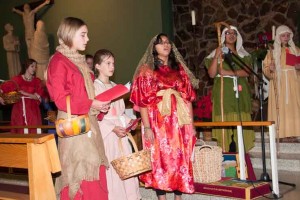Before we put the Christmas decorations away, some thoughts on the last Christmas Story, the one about the wise men:
wise men:
I am struck by how both wise and dense these characters are. They have the insight to read of Jesus’ birth in the stars, and what they recognize is that this baby is a king above all kings. A long pilgrimage of two years or so makes sense to them, all because of what they see in the stars. They even have some insight into what sort of king this baby will be. By bringing the symbolic gifts of gold, frankinsense and myrrh, they are demonstrating a deep understanding of the messiah’s mission. All this wisdom, but it doesn’t occur to them that the current king of the Jews isn’t going to be happy to hear about the birth of his replacement? The star shows them that this child is the king of the Jews, but they don’t think to find a copy of the Jewish scriptures to get directions before they leave home? The wise men are both wise and incredibly dense!
Their story, then, is one of great faith and terrible error. By going to Herod they set in motion the events that will lead to the slaughter of the Holy Innocents, and the Holy Family’s flight into Egypt. But their journey is also a template of faith–following, worshiping and obeying. I wonder if we might find something in this tale of faith and error?
Historically Christians haven’t had much tolerance for error. Right thinking (orthodoxy) is prized by all churches–indeed that’s why there are so many churches! We find or create a community of agreement, building up walls of statements of faith to clearly define who is in and who is out. In our worst moments Christians have energetically persecuted and even killed those with whom we disagree, but nowadays we tend to be content with exclusion, even exclusion from Heaven itself for those who do not share our theology. But if we take the story of the wise men seriously, then maybe it is time to step back from our rigid right thinking. The wise men, both so right and and so wrong, play their part in God’s plan despite their serious errors. Although we all think it will never happen to us, the odds are we will make mistakes, even theological ones, and yet God’s plan will triumph. Might this insight give us the freedom to act in God’s name while retaining the possibility of humility?
It’s not that theology isn’t important. Theology has tremendous power for determining what we treasure and what we do about it. We can’t say that all truth claims are equal or valid because they aren’t. Some truth claims are close-minded, even morally repugnant, and Christians should be able to recognize that. But our rigidity blinds us to something that Christmas celebrates, and that is God’s presence in the world. With our creeds we can see God’s presence in the church–our own community–and act on the implications. But God is not confined to our community: that is the message of the Incarnation. There is good outside our church, even outside Christianity, and we should be able to celebrate those victories of God’s Kingdom even when they don’t belong to us.
In the Christmas tradition, the wise men represent those outside the faithful community of Judaism, now coming to recognize their Creator and Redeemer. Perhaps their example of worship and failure can lead us to a new recognition of how God’s plan works, both involving us and going beyond us. To celebrate the Gospel’s victory of life wherever it is to be found–seems like a good idea to me. Easier said than done, no doubt, but possible. What do you think?

One Response
I love the message of an inclusive God. It is a deeper understanding of God that continues to lead us out of the Dark Ages of separation (misunderstandings; errors in our thoughts and behaviors) towards unity. Rev. Carol E. Parrish, stated, “An Interfaith Christian stands clearly within one’s own faith, but respectfully honors all other world religions for contributions they make to the lives of humanity. Building upon the area of sameness, we discover that, rather than amplifying the differences, we grow in an appreciation of the different histories, art, music, and culture. We realize once again God loves to garden and creation blooms in a wide variety of ways.